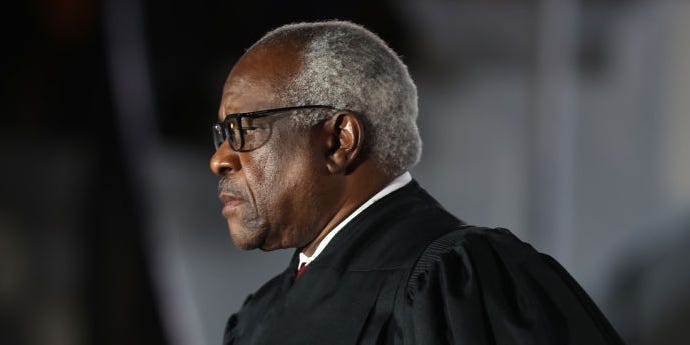Supreme Court Justice Clarence Thomas has set his sights on eliminating the Occupational Safety and Health Administration.
The Supreme Court on Tuesday announced which cases it would consider next and which it wouldn’t. Among those the court rejected was a case that challenged the authority of OSHA, which sets and enforces standards for health and safety in the workplace.
And Thomas, widely considered to be the most conservative justice on the already mostly conservative court, wasn’t happy.
In a dissent, he explained why he believed the high court should’ve taken the case: OSHA’s power, he argues, is unconstitutional.



TLDR: It may be unconstitutional in his opinion because of the Non Delegation Doctrine stemming from:
Basically Congress can’t just go and let the Executive branch do their job. The Executive can’t make new laws only enforce the existing ones.
https://en.m.wikipedia.org/wiki/Nondelegation_doctrine
This is my rub with Clarence in general. On paper I agree with a very hardline reading of the constitution cause what else is it there for. We’re far too allergic to making constitutional amendments and laws and have built up a house of cards that gets toppled every time the administration changes.
However, practically speaking, there’s too many actual lives depending on supreme court decisions and delegated regulations to wait for congress to do something about it (if they aren’t stalled outright by lobbying and party opposition). If the overturning of such decisions is meant to light a fire under the ass of the legislative branch, it operates much too slowly to protect the vulnerable people who suffer in the interim. Delegation is the only reason we have a (relatively) safe and clean place to live.
There needs to be a statute of limitations on how long the Supreme Court can reverse things. They can’t change things 40 years after the fact when entire agencies have been built and society has restructured around the previous ruling.
The problem with that is Korematsu v. US was decided in 1944 and is technically still the law as no subsequent cases have come up to overturn it.
Like I said elsewhere, just make congress review use of delegated authority regularly and rubberstamp it if the agency is acting reasonably, otherwise they just give new directives wherever they deem fit.
They might even let agencies notify select members of congress when changing any notable rules so they can decide if they want to call a legislative session or just OK it.
That respects the division of powers in the constitution while still letting regulatory agencies do their jobs
https://slrpnk.net/comment/9618565
The problem is that congress doesn’t do anything quickly (unless it’s giving themselves a raise). That’s the whole reason delegation was needed, because they’re so slow to actually pass specific laws. Previously, the rule was that any ambiguity in the law could be interpreted as needed by the relevant agency. That way the law can be “companies need to ensure a certain level of safety for workers” and OSHA with their panel of experts can figure out the details of what precautions are needed where. Even if a rubber stamp is all that would be needed, they have a huge backlog of regulations to get through and a lot of companies that will fight tooth and nail to save a bit of money on safety equipment. If the SCOTUS takes such a case and rules against OSHA’s authority, you best believe there will be blood on their hands.
That’s why I said only notable changes should need preemptive review (if any), everything else that’s standard procedure would just be documented and OK’d after
I agree it would have very bad consequences if the agency would get blocked entirely from acting
That’s great for a future where we have all of this sorted out, but it doesn’t help in the interim. It’s not like corporations will sit patiently while congress gets this figured out, they’re going to test the authority of OSHA and flood the courts with lawsuits to argue over every particular, doing more or less whatever they want in the meantime. Frankly I don’t believe congress can rubber stamp anywhere quick enough to protect the policies we already have in place.
The two party system has resulted in grid lock on anything pf actual value like codifying in law the things the SCOTUS has been rolling back. We’ve rested on our laurels for it to all be undone.
Is he sure he wants that if Trump gets into power?
He’s been writing about it long before 2016 so I’d imagine so.
Yeah, but that was before Project 2025.
deleted by creator
He usually cares about what the people who bribe him want and they want Project 2025.
We do have a problem with executive power creep so like there’s a world where I’m on board for non-delegation but there just is a reality that some questions are too small, detailed, and nuanced to expect a new bill out of Congress each time.
So like setting new tariffs, should be a congressional action and it was improperly delegated. Determining whether a new ladder is safe for workers, can be delegated.